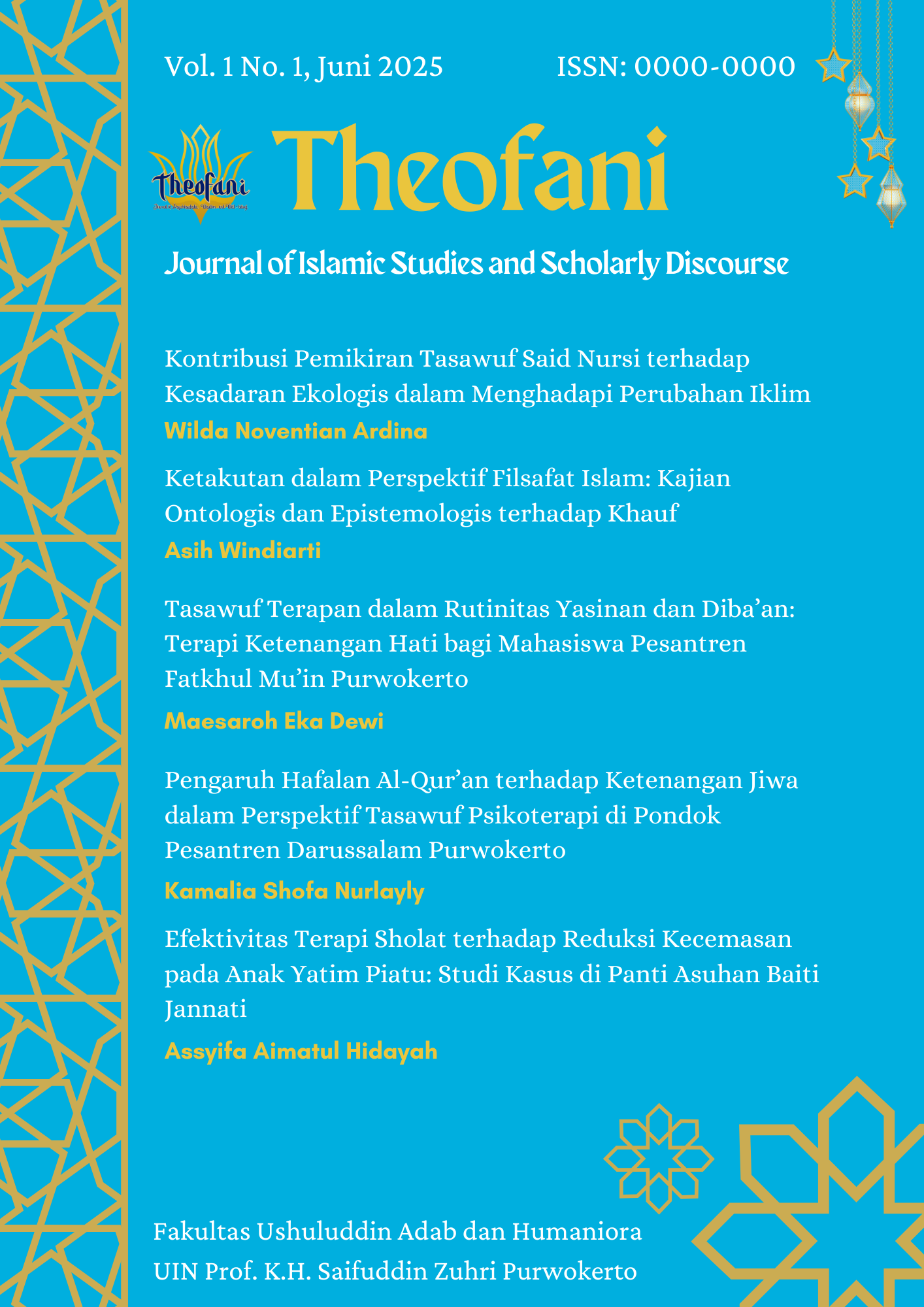Ketakutan dalam Perspektif Filsafat Islam: Kajian Ontologis dan Epistemologis terhadap Khauf
Keywords:
Khauf, Ketakutan, Filsafat Islam, Ontologi, Epistemologi, EksistensialismeAbstract
Ketakutan (khauf) dalam filsafat Islam bukan sekadar respons emosional terhadap ancaman, tetapi juga memiliki dimensi ontologis dan epistemologis yang signifikan. Studi ini menganalisis konsep khauf dalam pemikiran empat filsuf Muslim—Al-Ghazali, Ibn Sina, Mulla Sadra, dan Suhrawardi—serta membandingkannya dengan perspektif eksistensialisme Heidegger. Temuan penelitian menunjukkan bahwa khauf dalam filsafat Islam berfungsi sebagai mekanisme transformatif yang mengarahkan individu menuju kesempurnaan spiritual dan intelektual. Dalam konteks modern, konsep ini dapat dikontekstualisasikan dalam diskursus psikologi transpersonal, etika eksistensial, dan neurosains spiritual. Dengan pendekatan hermeneutika filosofis, penelitian ini mengungkap bahwa khauf tidak hanya sekadar ketakutan, tetapi juga pengalaman eksistensial yang dapat memotivasi manusia untuk mencapai kesadaran yang lebih dalam terhadap hakikat dirinya dan realitas tertinggi.References
Al-Ghazali, A. H. (2010). Ihya' Ulum al-Din (Menghidupkan Ilmu-ilmu Agama), Jilid IV. Dar al-Kutub al-Ilmiyah.
Baktiar, A. (2017). Filsafat Pendidikan Islam: Tinjauan Historis dan Kontemporer. Rajawali Press.
Bertolacci, A. (2018). The Reception of Avicenna in Latin Medieval Culture. Brill.
Chittick, W. C. (2012). In Search of the Lost Heart: Explorations in Islamic Thought. State University of New York Press.
Chittick, W. C. (2015). Divine Love: Islamic Literature and the Path to God. Yale University Press.
Creswell, J. W., & Poth, C. N. (2018). Qualitative Inquiry and Research Design: Choosing Among Five Approaches (4th ed.). SAGE Publications.
Damasio, A. (2018). The Strange Order of Things: Life, Feeling, and the Making of Cultures. Pantheon Books.
Davidson, R. J., & Begley, S. (2012). The Emotional Life of Your Brain: How Its Unique Patterns Affect the Way You Think, Feel, and Live—and How You Can Change Them. Hudson Street Press.
Deurzen, E. v. (2010). Everyday Mysteries: A Handbook of Existential Psychotherapy. Routledge.
Grof, S. (1998). The Cosmic Game: Explorations of the Frontiers of Human Consciousness. State University of New York Press.
Heidegger, M. (1927/1962). Being and Time (J. Macquarrie & E. Robinson, Trans.). Harper & Row.
Hidayat, K. (2020). Agama dan Kecemasan Eksistensial. Mizan Pustaka.
Husserl, E. (1913/1982). Ideas Pertaining to a Pure Phenomenology and to a Phenomenological Philosophy—First Book: General Introduction to a Pure Phenomenology (F. Kersten, Trans.). Nijhoff.
Ibn Sina, A. (2000). Al-Isharat wa al-Tanbihat (Petunjuk dan Peringatan). Dar al-Hadith.
Izutsu, T. (2002). Ethico-Religious Concepts in the Qur'an. McGill-Queen's University Press.
Kierkegaard, S. (1844/1980). The Concept of Anxiety (R. Thomte, Trans.). Princeton University Press.
Kuckartz, U. (2019). Qualitative Text Analysis: A Systematic Approach. Dalam G. Kaiser & N. Presmeg (Eds.), Compendium for Early Career Researchers in Mathematics Education (hlm. 181-197). Springer.
LeDoux, J. E. (2015). Anxious: Using the Brain to Understand and Treat Fear and Anxiety. Viking.
MacIntyre, A. (1981/2007). After Virtue: A Study in Moral Theory. University of Notre Dame Press.
Maslow, A. H. (1968). Toward a Psychology of Being. Van Nostrand Reinhold.
Merleau-Ponty, M. (1945/2012). Phenomenology of Perception (D. A. Landes, Trans.). Routledge.
Nasr, S. H. (2006). Islamic Philosophy from Its Origin to the Present: Philosophy in the Land of Prophecy. State University of New York Press.
Nasr, S. H. (2021). The Study Quran: A New Translation and Commentary. HarperOne.
Newberg, A., & d'Aquili, E. (2001). Why God Won't Go Away: Brain Science and the Biology of Belief. Ballantine Books.
Rizvi, S. H. (2009). Mulla Sadra and Metaphysics: Modulation of Being. Routledge.
Rustom, M. (2018). The Triumph of Mercy: Philosophy and Scripture in Mulla Sadra. State University of New York Press.
Sadra, M. (2001). Al-Hikmah al-Muta'aliyah fi al-Asfar al-'Aqliyyah al-Arba'ah (Hikmah Transenden dalam Empat Perjalanan Intelektual). Dar Ihya' al-Turath al-'Arabi.
Sartre, J. P. (1943/1984). Being and Nothingness (H. E. Barnes, Trans.). Washington Square Press.
Suhrawardi, S. Y. (1999). Hikmat al-Ishraq (Filsafat Illuminasi). Dar al-Maarif.
Vaughan, F. (2002). What is Spiritual Intelligence? Journal of Humanistic Psychology, 42(2), 16-33.
Walbridge, J. (2000). The Leaven of the Ancients: Suhrawardi and the Heritage of the Greeks. State University of New York Press.
Wilber, K. (2000). Integral Psychology: Consciousness, Spirit, Psychology, Therapy. Shambhala Publications.
Zohar, D., & Marshall, I. (2000). SQ: Spiritual Intelligence, the Ultimate Intelligence. Bloomsbury.
Downloads
Published
How to Cite
Issue
Section
License
Copyright (c) 2025 Asih Windiarti

This work is licensed under a Creative Commons Attribution 4.0 International License.







